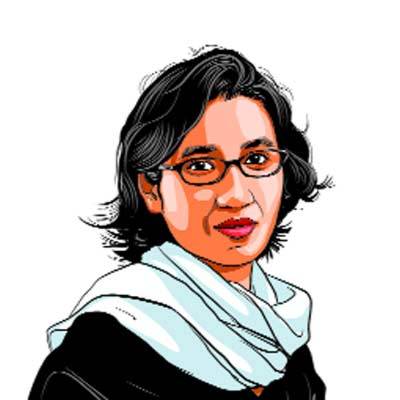 By Mallika Shakya—
By Mallika Shakya—
South Asia has shared a common sensibility for millennia. But now, New Delhi and Kathmandu increasingly tell a tale of two cities in terms of everyday struggles of citizens and the global hierarchy of power.
India’s unofficial blockade of its Nepal border is a new episode in this continuum, and although there are early signs that this may be resolved, it will take some time for Nepalis to heal from this trauma. I spent two quiet weeks with my mother who lives alone in Kathmandu and did not have enough gas to cook daily meals. The last whiff of LPG gas was saved for the time when the grandchildren would visit on days when their schools were shut, because the buses were forced to queue up for petrol up to three or four days a week. Many Nepalis relied on recipes of spicy salads and fermented vegetables — a culinary legacy of the prolonged blockade imposed on the people of Kathmandu two and a half centuries ago by the legendary conqueror-king Prithvi Narayan Shah.
With the current blockade exceeding three months, most Nepalis skipped the festive meals of Dashain and Diwali. The acute fuel shortage affected family reunions, as visitors were forced to board overcrowded buses navigating the accident-prone highways and winding through recently quaked hills. Even the Maoist guerillas had let the nation off the hook for Dashain during their decade-long “people’s war”. Invoking a wry sense of humour, some civil society leaders even staged a satirical ritual at the Pashupatinath temple to wash away the sins committed by Indian Prime Minister Narendra Modi by imposing the blockade on Nepal.
The government still rations fuel for public vehicles. Hospitals still suffer from an acute shortage of emergency medical supplies, causing losses of lives that could have been prevented. The latest statement from the Indian external affairs ministry might have caused some optimism, but Nepalis doubt things will normalise soon. There is pent-up frustration among the youth, even if they have the wisdom to recognise that there is no easy way out. Many joined #KathmanduWithMadhesh rallies, thus contradicting the assumption of an Indian friend who poked fun sympathetically that if this had happened to America, they would have bombed India by now.
What is very unfortunate is the ominous silence of the Indian media on the humanitarian consequences of the blockade. Nepal and India have a relationship of bread and bride, but most media outlets seem to have just one or two individuals who could report on the ground reality from Nepal. This has essentially meant that the diversity of views has not reached the Indian public. It is true that Nepal remains divided between pro-blockade Madhesi activists and anti-blockade ultra-nationalists. But in between, lies a very large constituency that supports the grievances of Madhesi-Nepalis but calls on them to organise a genuine satyagraha directed at the Nepali government, without being pawns in imperial designs.
It is equally unfortunate that the Indian media has given very little space to the public statements issued by Indian civil society — most notably filmmakers and other public intellectuals opposing the blockade. It is a great irony that South Asia allowed its borders to be captured by parochial interests when the world is embracing post-nationalist visions of regionalism and globalism.
Even if the blockade is lifted, following the MEA’s statement welcoming the new steps on the constitutional amendment, its effects will remain. We should be worried about the dangerous precedent set by the polarising politics of the border blockade.
Nepal’s new constitution is not perfect and some of the blunders committed will haunt the country for years to come. The Tharus, who are indigenous inhabitants of the Tarai-Madhesh belt, were denied fair representation just to ensure that a certain former prime minister’s own electoral future is secure in the far-western region. The cultural identity of the Janajatis from the hills was not adequately recognised either. Women’s citizenship rights were curtailed, their call for equal citizenship shelved. But what is worrisome about the tactic of the blockade is that it helped construct a dangerous dichotomy Madhesi vs Pahadi while muffling the diversity of dissent. The Janajatis are being conveniently lumped into the Pahadi category of oppressors. The voices of Dalits, Tharus and the poor have been conveniently muffled under the charged rhetoric of border and nation.
India should take measures to ensure that the backlog on essential supplies of medicines, cooking gas, kerosene and petrol is cleared as soon as possible. Delhi then needs to rebuild its relations with Kathmandu and ensure that its policies do not favour the political struggle of one agitating Nepali constituency against the others. Above all, India should withdraw from any imperial designs in the region if it truly believes in South Asianism and the spirit of Panchsheel.
(This article was originally published in the Indian Express on Dec. 23. Writer is associated with the South Asian University in New Delhi)

